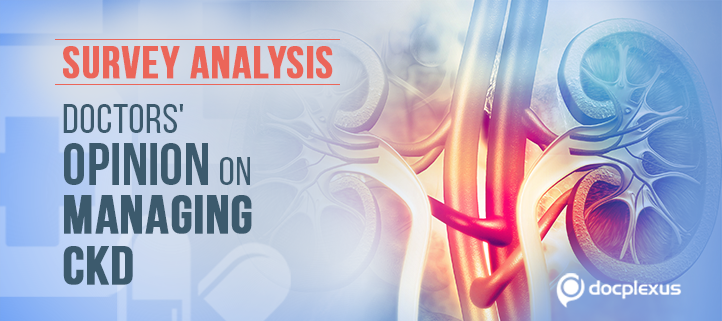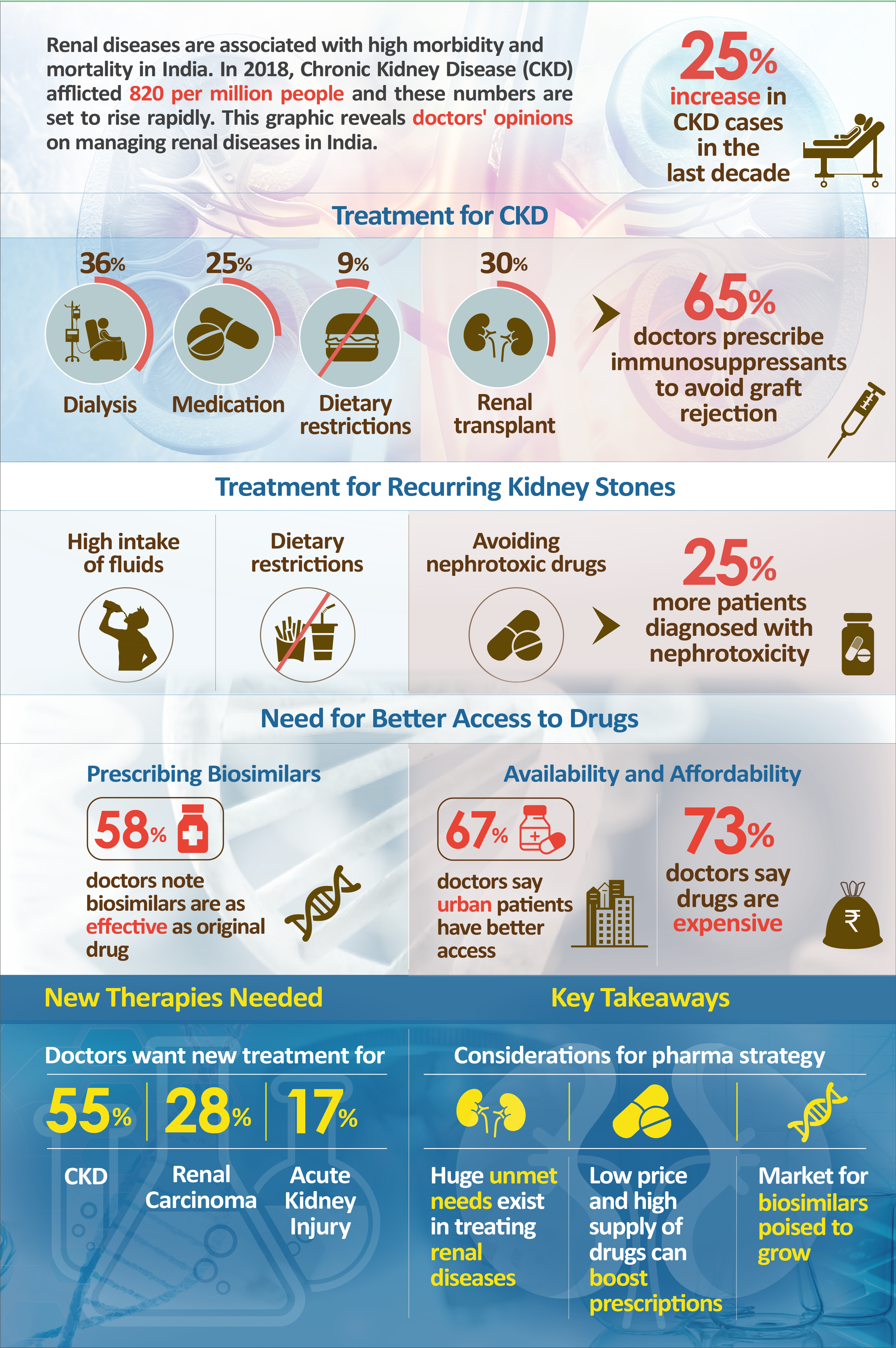
Chronic Kidney Disease (CKD) is the 8th leading cause of death in India. Several Pharma companies have launched drugs in this therapy area, while others are conducting clinical trials. However, several gaps still exist and correspondingly, plenty of opportunities to innovate. The worldwide nephrological drugs market is currently valued at USD 15.55 billion in 2022 and is expected to grow to USD 26.99 billion by 2032 CAGR of 5.67%. In India, the market is expected to grow at a steady rate of 3-5%.
To help pharma get a better understanding of what doctors need to manage Nephrological Disorders, we conducted a survey on our community.
Survey Details:
Aim: To understand doctors’ viewpoints on treating kidney disorders
Methodology: A nationwide online poll on Docplexus
Respondents: 328 nephrologists, pediatric nephrologists, urologists and pediatric urologists, general physicians, and transplant surgeons
Survey Findings:

Analysis:
Rapid Rise in CKD Cases
Doctors claim an average 25% rise in number of CKD cases in the last decade. According to a study published in the Indian Journal of Nephrology, diabetes and hypertension are responsible for 40-60% of all CKD cases. A Lancet study has identified Andhra Pradesh, Central Odisha, Puducherry and Maharashtra as the hotspots for kidney diseases in India.
Severity of the disease is important for nephrologists to decide the treatment for CKD. In case of co-morbidities like diabetes and hypertension, doctors prescribe drugs to control blood sugar and blood pressure levels. Dietary measures and lifestyle changes are also recommended.
30% doctors who took this survey said that they recommend renal transplant as the treatment, while 36% prescribe dialysis.
On the other hand, 36% doctors recommend dialysis until they manage to get a renal transplant done. Timely planning for a renal transplant is of utmost importance according to physicians. To make matters worse, every year at least 200,000 more patients are found to be in need for the treatment.
Graft Rejection A Key Parameter for Prescribing Immunosuppressants
Statistics find 97% transplanted kidneys to be working at the end of one month, 93% at the end of one year, and 83% at the end of 3 years. Patients are advised to take immunosuppressant drugs for the rest of their life to prevent their immune system from attacking the new organ. 63% doctors who took this survey said that they either alter the dosage of immunosuppressants or change the drug if they notice symptoms of graft rejection.
Another reason for changing the drug is the adverse effects of an immunosuppressant. Drugs may cause infection, weaken the patient’s immune system, etc.
Most Drugs are Expensive and Unavailable in Rural Areas
73% practitioners found drugs to treat nephrological disorders to be expensive for the common man. A study shows that the average cost of haemodialysis (including erythropoietin and medications) is between INR 9,000 and 10,000 in subsidized centres and INR 20,000 to 30,000 in private hospitals of tier I and II cities. Also, 67% physicians opined that medications are easily available only in urban areas. The high cost and unavailability of drugs become reasons for non-adherence to treatment, especially in the case of renal transplants where patients are expected to take immunosuppressants for the rest of their life.
Biosimilars are Considered as Good Alternatives
Considering the life-long need for immunosuppressants for transplant patients, pharma companies introduced biosimilars that are cheaper and have equal efficacy. 58% healthcare providers agreed that biosimilars are equally effective as original molecules. With continuous advancement in drug research, it is expected that adoption of biosimilars will rise, cutting down overall cost of nephrological care.
Nephrotoxicity and Recurring Kidney Stones a Growing Concern
Nephrotoxicity is a condition when the body is exposed to a drug or toxin that causes damage to the kidney. The exposure increases creatinine and blood urea nitrogen (BUN) levels, leading to renal failure. Physicians stated that the number of nephrotoxicity cases has increased by an average 25%.
Doctors are concerned about recurring kidney stones among people with CKD. Most physicians advise dietary and lifestyle changes to their patients They also consider reviewing the type of stones to suggest necessary changes in diet, increased water intake and avoidance of nephrotoxic drugs. However, physicians are looking for a medication to cure recurring kidney stones.
New Treatment Needed for CKD
53% doctors feel the need for newer therapies for CKD. Currently, doctors recommend dialysis or renal transplant. They also prescribe medications like ACE inhibitors, β blockers, calcium-channel blockers, diuretics, etc for treatment. Most drugs carry the risk of side-effects. New treatment is also being sought for acute kidney injury (27% respondents) and for renal carcinoma (16% respondents).
Takeaways for Pharma
The rapid rise in CKD cases surely opens doors for pharma to either launch new drugs or improve the efficacy of existing ones. Below are few points that every company launching or expanding in this space should remember
1.There is huge unmet need in treatment of CKD, acute kidney injury and renal carcinoma
2.Lower drug costs and better availability key to increase uptake by physicians
3.Market for biosimilars in nephrology space set to grow.
25% respondents preferred online channel to stay updated with the latest developments in nephrology. Docplexus, a community of 300,000+ doctors, provides online resources to HCPs for learning and acts as a channel for medical dialogue and discussion. We offer pharma companies Innovative Content Marketing Solutions like Infocenters, KOL Webinars, Online CMEs, Mindset Analysis and Sponsored Medical Updates.
